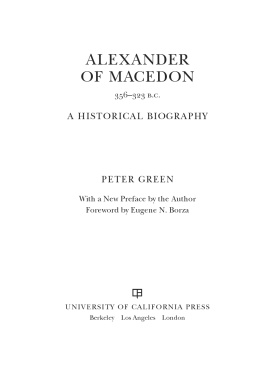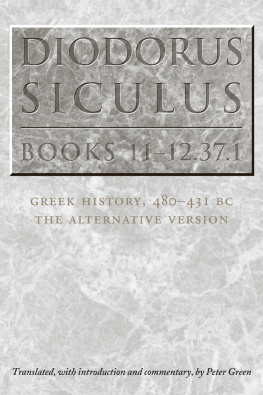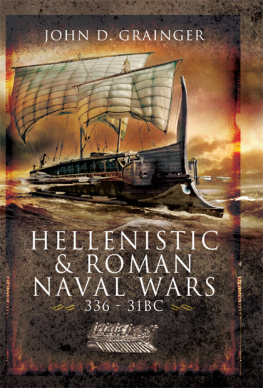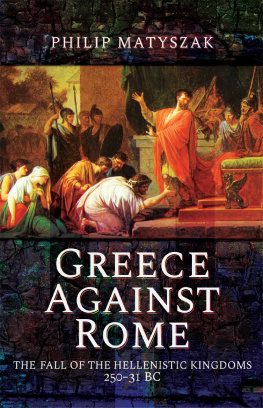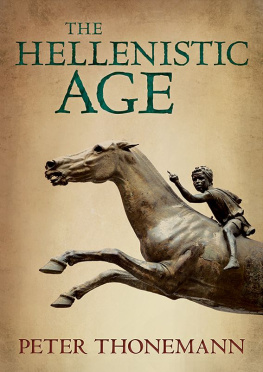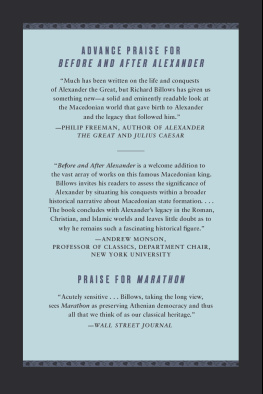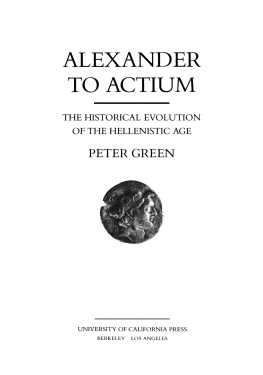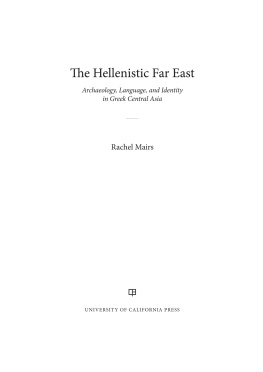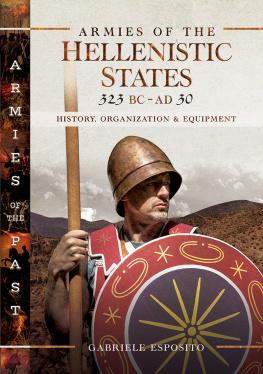ALEXANDER
TO ACTIUM
THE HISTORICAL EVOLUTION OF THE HELLENISTIC AGE
PETER GREEN
UNIVERSITY OF CALIFORNIA PRESS
BERKELEY LOS ANGELES
Title page: Tetradrachm of Demetrius I.
Photo by Ellen Kitzmiller.
The publication of this book was made possible in part by a grant from the National Endowment for the Humanities.
University of California Press
Berkeley and Los Angeles, California
1990 by Peter Green
Library of Congress Cataloging-in-Publication Data
Green, Peter, 1924
Alexander to Actium.
(Hellenistic culture and society ; 1)
Bibliography: p.
Includes index.
1. Mediterranean RegionHistoryTo 146 B.C. 2. GreeceHistoryMacedonian Hegemony323281 B.C. 3. GreeceHistory281146 B.C. 4. Hellenism. I. Title. II. Series.
DE86.G738 1990 938 864339
ISBN 978-0-520-08349-3 (pbk)
eISBN 978-0-520-91414-8
Dis manibus
F. E. Adcock
G. T. Griffith
W. K. C. Guthrie
J. E. Raven
with gratitude for much wisdom freely shared, and in affectionate memory
The historian may well interest himself in the state of things, the condition of society, the principles underlying a system of government or a system of thought. But if he is to understand historically and practice historical writing, he will have to think of such analyses as steps in a chain of events, as matters explanatory of a sequence of happenings. He will have to concentrate on understanding change, which is the essential content of historical analysis and description. History treats fundamentally of the transformation of things (people, institutions, ideas, and so on) from one state into another, and the event is its concern as well as its instrument.
G. R. Elton,
The Practice of History
Chorus of all. All, all, of a piece throughout:
Thy Chase had a Beast in View;
Thy Wars brought nothing about;
Thy Lovers were all untrue.
Tis well an Old Age is out,
And time to begin a New.
Dance of Huntsmen, Nymphs,
Warriours, and Lovers
John Dryden, The Secular Masque
, ,
,
, ,
,
.
Choerilus of Samos
CONTENTS
Argo
Idylls of Theocritus, the Mimes of Herodas
Si monumentum requiris ...
Praxis
MAPS
PREFACE AND ACKNOWLEDGMENTS
The Hellenistic age has one great advantage for us: it is easily definable. Its unity was first perceived, its limits set, even its name invented, by the nineteenth-century German historian Johann Gustav Droysen. For him, as for most subsequent students of the period, it began with the death of Alexander the Great in 323 B.C., continued through the rise, decline and fall of the great kingdoms carved by his marshals (known as the Diadochoi , or Successors) from the empire he left, and ended with Octavians dissolution of the last of these, Ptolemaic Egypt, in 30 B.C., just under three centuries later. This is a modern perspective: it is highly doubtful whether any ancient writer, from the Augustan age onwards, ever recognized the problem in these terms. Romes triumph encouraged an innate natural tendency to take short views.
It follows that to attempt a historical survey of the Hellenistic period means, in effect, writing the history of the Greek world, the oikoumen , during that period: not only of the Greek-speaking cities and states (as opposed to those that merely employed the vernacular Attic koin as a lingua franca ), but also of those far larger areas, profoundly alien in speech and culture to the Greek spirit, that were forcibly taken over, and in a very real sense exploited, by foreign overlords: Greek, Macedonian, and, later, Roman. It became clear to me during my researches that the degree to which this Graeco-Macedonian diaspora spread its much-vaunted culture, its reasons for doing so, and the audience it reached, especially in the East, had been in ways badly misrepresented. Thus one of my objects in writing the present work is to draw a more realistic picture of the impact, nature, and limitations of this diffusion.
I must state plainly at the outset that I regard the whole notion of a conscious, idealistic, missionary propagation in conquered territories of Greek culture, mores , literature, art, and religionmuch less the undertaking of such conquests, whether by Alexander himself or any of his successors, with this ulterior end in viewas a pernicious myth, compounded of anachronistic Christian evangelicism and Plutarch-inspired wishful thinking, and designed (whether consciously or not) to provide moral justification for what was, in essence, despite its romantic popularity, large-scale economic and imperial exploitation. Edouard Will points out how much the prewar attitude to Hellenistic imperialism was conditioned by la bonne conscience colonialiste, and to what an extent le choc de la dcolonisation nous a fait prendre conscience de ce qutaient les ralits coloniales, with a very similar impact on the thinking of the Hellenistic historian.
I must also, at the same time, emphasize that this does notsince I am old-fashioned enough to prefer operating with a free intellect, an open rather than a closed mindmean that I am either a declared or a covert Marxist, as should become abundantly clear in the course of this book. Throughout I have been in pursuit of the truth, an aim much ridiculed today, for their own partisan purposes, by committed ideologists; and though neither I nor any reasonable person would believe that Rankes ideal of writing history wie es eigentlich gewesen sei is attainablewhat ideal is?that does not release the historian from the harsh obligation of striving for it to the best of his or her ability. To do otherwise is as though (to draw a theological parallel) the concept of inherent human sinfulness and fallibility were taken as a self-evident reason neither to pursue virtue, nor to avoid error; or, worse, as indicating that the terms virtue and error had no significant meaning.
When I first embarked on the vast task that I had, with incurable optimism, set myself, my primary aim was simple enough: to provide an up-to-date and unified survey of a period heavily worked by specialists, but still too often ignored by those (including many professionals) in the habit of skipping adroitly from Alexanderif not from the defeat of Athens in 404to the rise of the Roman Republic. Such a synthesis must of necessity rest, to a great extent, on foundations laid by the great pioneers in the field. Hellenistic history as we know it would be inconceivable without the work of such scholars as Droysen, Niese, Berve, Wilcken, Tarn, Rostovtzeff, Holleaux, Bouch-Leclercq, and Praux, not to mention countless others still living, all of whom have contributed so much in understanding to every aspect of this multifaceted age. Yet, at intervals, a time arrives, for this as for other periods and areas, when it becomes desirable to pull all the threads together in the light of a mass of new discoveries and changing interpretations, and to attempt an interim overview, governed by a single outlook.


